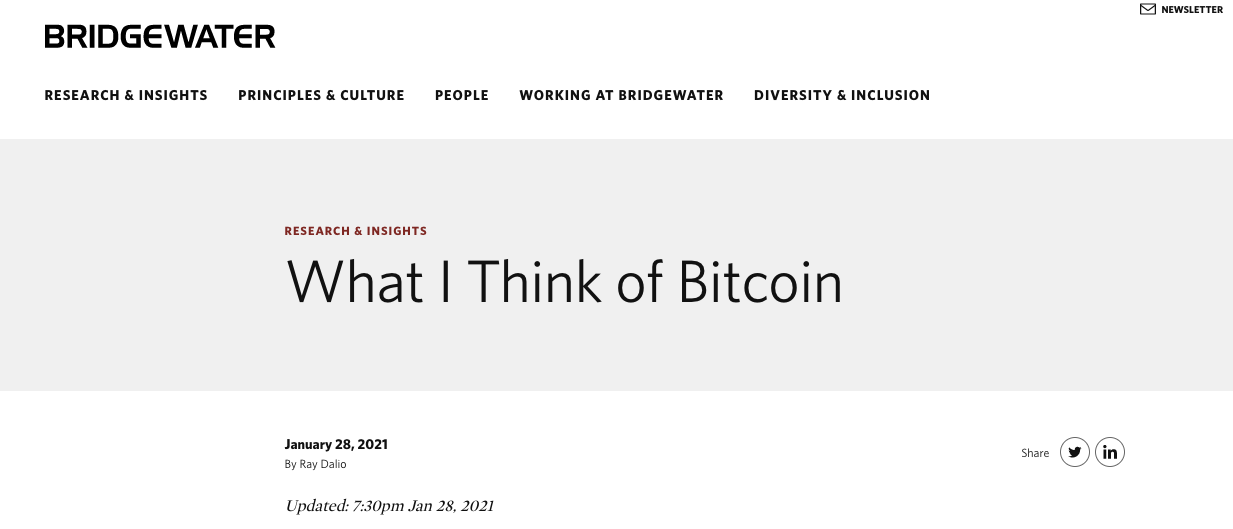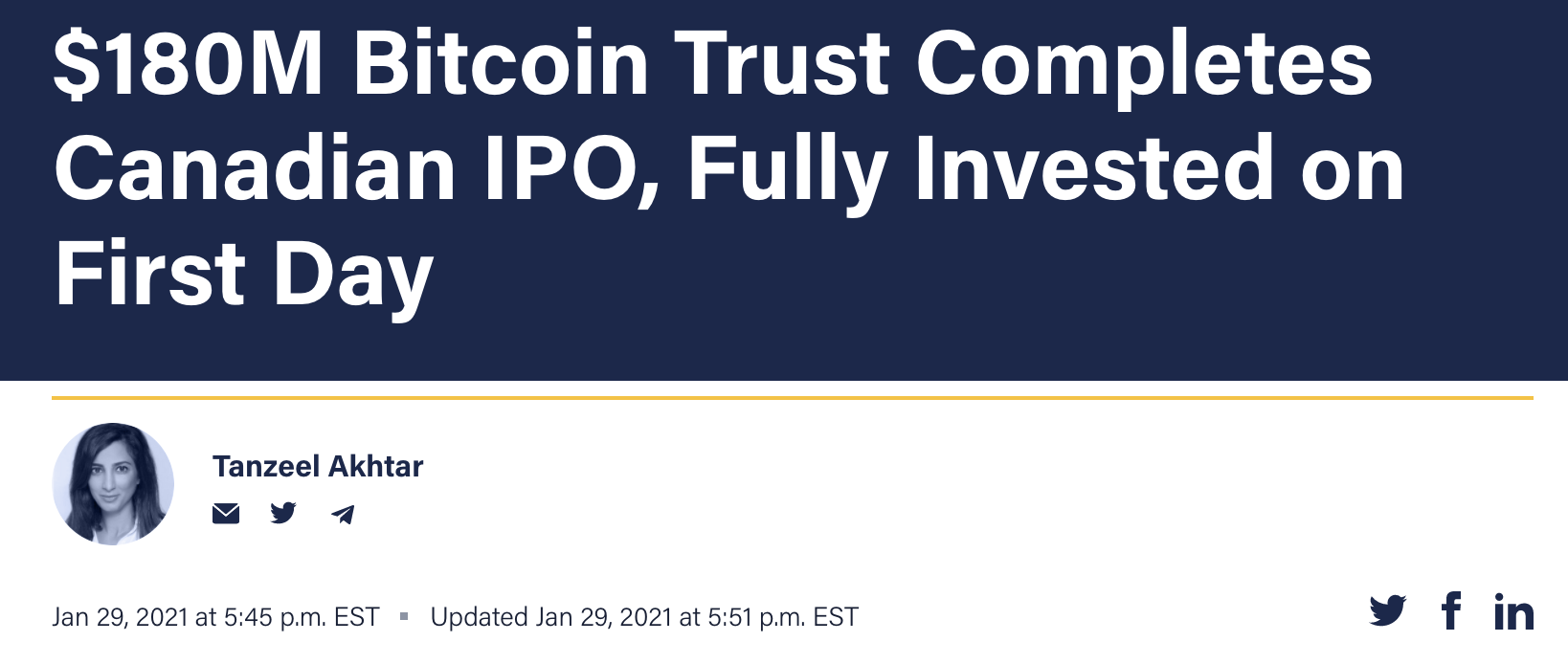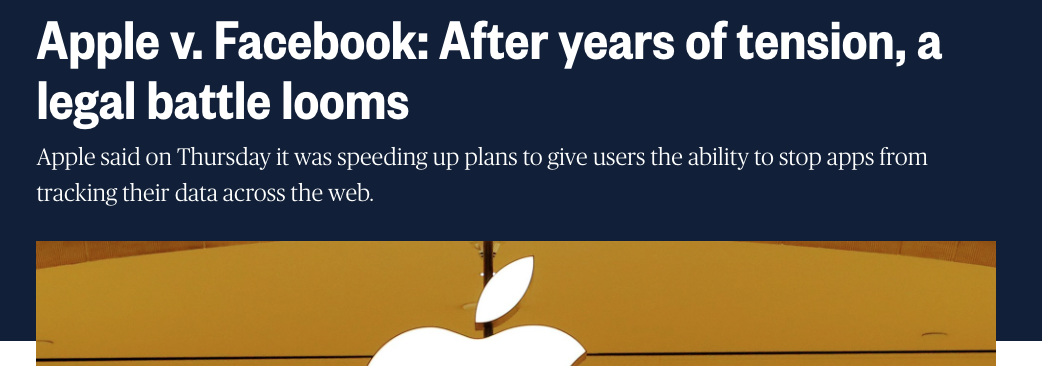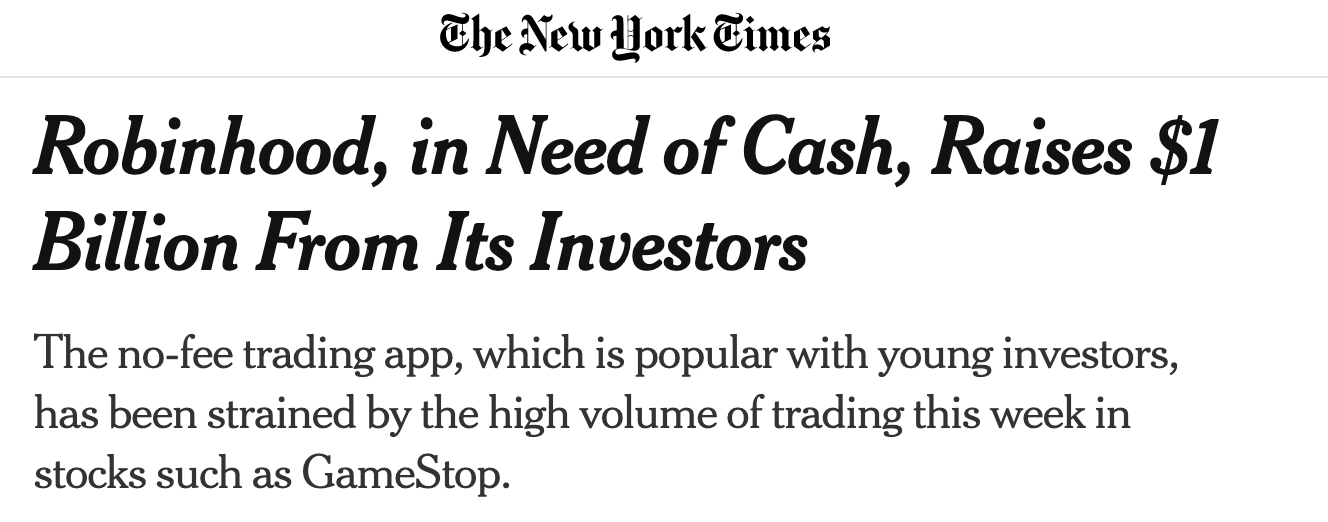Ledn Blog
The Bitcoin Economic Calendar - Week of February 1st 2021
Bitcoin: New Billionaires & Traded Funds, WSB/GameStop: Implications for Bitcoin (& DeFi), The Fed still has the markets' back.
Not yet a Ledn client? Start earning 12.25% APY on your USDC and 6.10% APY on your Bitcoin - click here to open your Ledn account!
Follow us in social media:
The Bitcoin Economic Calendar:
Week of Monday February 1st to Sunday February 7th.
Market Commentary:
Bitcoin: Very active week in the Bitcoin markets which saw heavy volume last week, finishing up 2.63% at $33,137. Price action was quite interesting and we can go through some of the dynamics that played out. On Thursday, none other the Ray Dalio published a letter title "What I think about Bitcoin", going on to say "It seems to me that Bitcoin has succeeded in crossing the line from being a highly speculative idea that could well not be around in short order to probably being around and probably having some value in the future.". For context, Ray Dalio is the co-Chief Investment Officer at Bridgewater, which is the largest hedge fund in the world.

As if that weren't enough, on Friday Elon Musk changed his twitter bio description to just "#Bitcoin" and tweeted "in retrospect, it was inevitable" right after.

This was interpreted as a tacit endorsement, which coincidentally happened just minutes after another market-moving event, the expiration of the Jan 29th options. The "Elon" rally could not be sustained as it elevated the perpetual funding rates for Bitcoin but the cash/spot markets were not able to "catch up" and faded into the weekend.
There can be deep implications of the brewing narrative around equity markets for Bitcoin. We'll discuss this at length in our "Market Trends" section later today. Later on Sunday, the news broke that a new Bitcoin fund traded in the Toronto Stock Exchange had completed its IPO and its $180 Million had become "fully invested" in one day. Another strong sign that investor appetite for Bitcoin remains strong.

We'll also discuss what the options markets are showing for Bitcoin's February expirations along with the futures markets in our Whats Ahead for the Week section below.
S&P 500: The S&P 500 closed a tumultuous week down -3.31% at 1,712. We will go into what is happening with GameStop and the markets in general in our Market Trends section today - as there is a lot going on there and it could have dramatic ramifications. Before we do that, let's look at the data is showing us.
First, the insights from the first FOMC meeting of the year. Powell emphatically reaffirmed their commitment to reaching full-term employment. It also recognizes that the lowest-income segment of employment is the one hardest hit, pointing out that Hispanics and African Americans have been disproportionately affected. It is also aware that the housing market has made almost a full recovery, but the same cannot be said for manufacturing and other industries. This also hints at the fact that they continue to need a weaker dollar to make local manufacturing more competitive. The Fed also addressed the concerns many investors had about the 10-year treasury yields by reaffirming several times over that it would not taper its bond purchases any time soon. This should bode well for the U.S. manufacturing sector as well as commodities. Regarding inflation, the Fed says that it will not be rushed to act even if it sees "transient inflation spikes" which go above 2% - reaffirming to let inflation go over 2% in the short term to reach their long-term average.
On the earnings front, Apple announced a blowout quarter with sales topping $100 Billion in revenue for the first time, up 21% YoY. Apple did not provide guidance for future earnings - it has not done so since the pandemic began. Interestingly, Tim Cook added that the lack of stores are hurting wearable sales. In other market-moving news Tesla beat revenue expectations but fell short on earnings. Interesting to see market darlings continue to post impressive numbers in the current backdrop.

There also seems to be a privacy battle brewing between Facebook an Apple based on Apple's planned privacy upgrades for its iOS 14 operating system. If this continues to unfold, it could lead to a large legal showdown between 2 market darlings, which could put some pressure on the "FANG" sector.

Gold: Even with the positive backdrop from the Fed's announcements and the turmoil in the equity markets, Gold was not able to book a winning week - down -0.44%% to close at $1,846/oz. The dollar index (DXY) did rise by about just as much over the week so that may have played a role in the headwinds to gold. The Fed is openly looking for inflation and to keep rates low. This should continue to be a tailwind well for gold in the foreseeable future.
DeFi: The FTX DeFi index close another monster week up 11%. The events that are transpiring in the equity markets have deep implications for DeFi. The U.S. equity markets have been perceived as the most "free and fair" markets globally for a long time. For the first time in a long time, the concept of the "free" market is coming into the hot seat in the main stream narrative. We seem to be at the early stages of an important narrative shift around DeFi. At the root of it is the fact that the very centralized frameworks that it is meant to replace are being rightfully questioned. The price action is clear, whether it is speculators or long-term thinkers, there continues to be intellectual curiosity and demand for assets in the sector. This could potentially act as a tailwind for the sector overall in the coming months.
The GameStop Phenomenon: Facts, Perception, and Implications
Over the last week we've seen a dramatic turn of events in the GameStop saga. Taking into consideration how many people have been affected, how many are still rallying behind the cause, and the reactions and signals sent by politicians and regulators alike, and this could very well be a turning point in the perception of American equity markets.
To really understand how this can unravel into something much bigger than GameStop it is important to break down the events and who is being affected.
What 'the people' think happened
Last Thursday, in what was a relatively low-volume trading day for GameStop, Robinhood and other retail trading platforms started placing restrictions on the purchases of GameStop and other shares on their clients. During that day, GameStop moved from $112 to $483 - tossing clients in and out of profits for their locked positions, and in some cases - liquidating client's shares.

The news generated outrage across social media and mainstream media - with celebrities and politicians on all sides calling out RobinHood and "Wall Street".
Even Republican Senator Ted Cruz retweeted Democratic Congresswoman Alexandra Ocasio-Cortez's tweet in agreement. The tweet demanded to know more as to why retail investors could not trade the stock while hedge funds are able to freely trade it.

To make matters worst, Citadel - which is a giant financial services company out of Chicago is one of RobinHood's largest sources of revenue, and in addition, also injected billions of dollars into Melvin Capital - one of the hedge funds that had a very large position on GameStop. Citadel and its CEO Ken Griffin, have quickly become the boogeymen to the American retail investor community. Another investment giant that invested hundreds of millions of dollars into Melvin Capital, Point72, and its CEO Steve Cohen has have to leave twitter for the reported outrage he has received. The Wall Street Journal reported that Melvin Capital had lost 53% in January and added "[Melvin] started the year with about $12.5 billion and now runs more than $8 billion. The current figure includes $2.75 billion in emergency funds Citadel LLC, its partners and Mr. Cohen’s Point72 Asset Management injected into the hedge fund on Jan. 25.".
What "the experts" think happened
Articles and tweet storms abound from experts breaking down the market structure dynamics that led to RobinHood and other brokers to pause new buys in certain company shares. To break it down in a simplified format, when a client makes a purchase through a stock broker, the same places the order and has to hold the cash to settle the trade in 2 days. Until then, it has a pending payment to its clearing house (the entity that takes the cash and eventually settles the stock). When the broker extends credit or leverage for the clients to buy more stock, this makes matters even worst.
Therefore, when a rush of new orders come in a very short period of time, the broker dealer's debt to the clearing house soars - and the clearing house demands more collateral to ensure that the broker will not default on the eventual settlement. If the broker is not able to provide more cash to maintain its margin, it cannot allow the debt to grow larger because the clearing house will not allow it to. To solve the issue, RobinHood had to borrow fresh cash from its investors to post additional collateral and resume trading for its clients.

What are the implications?
Many - and potentially very meaningful. The outcome has been that millions of Americans have lost money, and perception is that the system's "pipelines" are designed to protect large investment firms and "the market" at the expense of retail investors. People are mad - and the politicians can feel it. Millions of people mean millions of votes, and billions of dollars many times mean very little votes.
On a personal note, I have seen a similar dynamic play out before. As Chavez was unleashing authoritarianism in Venezuela and expropriating companies on national television to a cheering crowd, there were experts screaming to that this would end the Venezuelan economy. However, what the people perceived was an economic boom - led not by Chavez' actions, but by booming oil prices. It didn't matter how many times people wrote or spoke about the fact that it was oil-driven. What people saw was authoritarianism running wild, companies being given to "the people" and their personal finances improving. Nothing else mattered. Chavez' rule was untouched because the people perceived he was doing a good job.
Politics is about public perception. Millions of Americans lost a lot of money and a few wealthy groups were able to protect their asset base on the back of "protecting market integrity". This is a difficult setup for politicians - they will face tremendous pressure to act. From David Portnoy to The Winklevoss Twins and Fox to CNN, the media is _all over_ RobinHood, Citadel, and any hedge fund or investment group that has had any involvement in the matter. Layer on top that the U.S. has been on a very polarized political context, and this event seems to have triggered unity from Ocasio-Cortez, to Donald Trump Junior, to Ted Cruz, to Ro Khanna. There will likely be a congress/senate hearing with Citadel and RobinHood - and the world will be watching.
The real winner in this could be the decentralized financial markets - starting with Bitcoin and ending in Decentralized Finance and Security tokens. Politicians will try to restore the faith of the American people in the markets. A lot will depend on the actions they take in the coming weeks.
Difficulty Commentary
Not much has changed on the difficulty front since last week. Our next difficulty adjustment is on track for next Saturday evening and is showing a small increase to about 21 TH. The Bitcoin mempool is near all-time high levels - that means that fast transactions on the network this week will likely be expensive and can take longer than usual. Next difficulty adjustment should help but until then it is good to plan accordingly.
What's ahead for the week:
In the midst of the RobinHood/GameStop saga, Elon Musk - one of the most influential businessmen in the world, changed his twitter profile description to #Bitcoin and tweeted to his 44+ million followers that it was "inevitable in retrospect". The fact that centralized market structures are coming under heat at the same time as billionaires around the world give Bitcoin its blessing, can be a very powerful force of change. Musk and Dalio will not be the last billionaires to voice their found support or belief in Bitcoin. From Bridgewater to Blackrock, to Guggenheim and Fidelity, Bitcoin has made its way through the financial establishment. Next stop would be sovereign wealth funds and central banks.
The U.S. equity markets will likely be more driven by the GameStop dynamics than the Fed or earnings. The fact that large funds have booked large losses on their short positions will force them to also close some of their long positions, which will keep pressure on the indexes as we saw in the week prior - even with an encouraging Fed and blowout earnings numbers, the major indices were down. This may continue if "the market" continues to put pressure on anything that has a built up short float. The next target from the Reddit army seems to be the silver ETF SLV.
On the Bitcoin options front we are seeing some decent activity in the $40k level for February 12th and 26th expirations. On the CME front, the futures curve is becoming flat from May to June tapering at the $36k level. Levels to keep an eye on as we head into what will likely be a week of heavy volume.
As always, we'll keep you posted on any relevant news throughout the new year right here and from our Twitter account @hodlwithLedn
Canadian Central Banking Updates:
Current Target Interest Rate: 0.00 - 0.25%
Current Overnight Money Market Rate: 0.23%
Source: https://www.bankofcanada.ca/rates/
U.S. Central Banking Updates:
Current Fed Interest Target Rate: 0.00 - 0.25%
Current Effective Federal Funds Rate: 0.09%
Source: https://apps.newyorkfed.org/markets/autorates/fed%20funds
